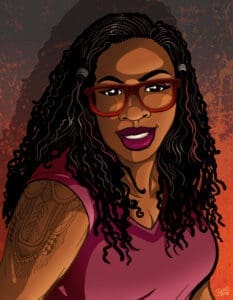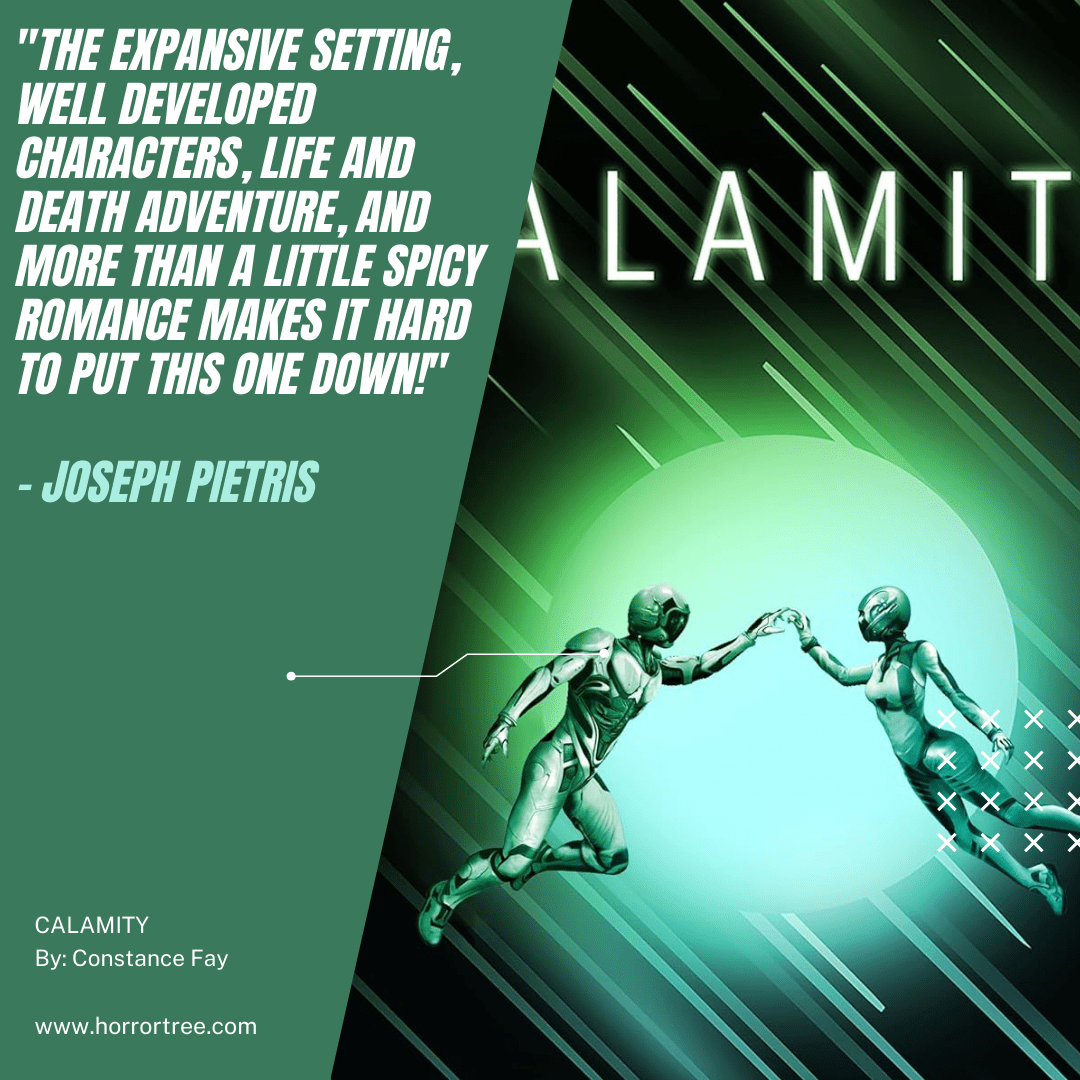The Horror Tree Presents: An Interview With Zin E. Rocklyn
 Selene – Welcome to the Horror Tree, and thanks for agreeing to an interview. First, tell us a bit about yourself, as there doesn’t seem to be much out there on social media. How did you start writing?
Selene – Welcome to the Horror Tree, and thanks for agreeing to an interview. First, tell us a bit about yourself, as there doesn’t seem to be much out there on social media. How did you start writing?
Zin – Hi, Horror Tree World! I’m Zin and I write pretty much everything within the Speculative Fiction realm with a dash of horror. I’m of Trinidadian descent which also influences my work. I began writing when I was a child, maybe six or seven, when all the books I loved didn’t feature a child like me.
Selene – What about horror draws you, as an author? Your work seems to include elements of fantasy and magic realism, as well.
Zin – It’s partially my older brother’s fault; he tried to traumatise me with horror movies all the time, but it didn’t work. Something about the monster always drew me in because of how quickly society relegated me as the monster being a Black child. There’s something about the fantastic and horrifying that suffices to illustrate the Black experience in America, if not the world.
Selene – I read and reviewed Flowers for The Sea, over on YouTube. Tell us a bit about its upcoming release.
Zin – I’m super excited! It’ll be birthed on October 19, 2021.
Selene – The novella was described as “Rosemary’s Baby By Way Of Octavia Butler.” How do you feel about this description? What inspired you to write the story?
Zin – I think it’s incredible! I’m a fan of both Rosemary’s Baby and Octavia Butler so I’m honoured to be anywhere near those examples in any context, lol! Inspiration strikes at the oddest of times and I honestly can’t place the influence for Flowers with the exception of the prompt from which it started. It’s amazing what happens from one line of guidance.
Selene – Another description I found intriguing was “A Black girl who doesn’t save the world.” One of Iraxi’s defining characteristics is her all consuming anger. I thought it was an interesting look at the theme of a saviour in an apocalypse, and defying some of the expectations we have of story tropes. What do you think?
Zin – I definitely set out to defy the expected with a lot of my stories. Not only is there the trope of the saviour of the apocalypse but the idea of the sacrificial negro when Black characters are featured in this genre. More than anything, I want to see us at the end.
Selene – I really enjoyed Iraxi as a character. She was brash and cruel but also mostly right. How do you create your characters?
Zin – Honestly, a lot of my characters are facets of me in different situations. We are all conglomerates of our experiences and influences from other folks and one of the fun things about creating characters is putting all of that together in a plausible way.
Selene – A fun question. If they were making a movie of Flowers for the Sea, who would be your “dream cast”?
Zin – Oh, man! It’s so rare that I actually cast my stories with known actors and actresses, but thinking about it now, I’d say Dev Patel as Amit, Wunmi Mosaku as Iraxi, and Ahmed Ezz as Hirat.
Selene – The novella contained quite a bit of body horror. How do you write gore? How much is too much?
Zin – As a disabled person, my body constantly “betrays” me and from what I’ve experienced myself of pregnancy as well as the stories of childbirth, there is a plethora of horror involved and a lot of folks fail to realise that. I want people to be connected to the “gore” not completely grossed out by it. It’s a delicate balance that I hope I pulled off.
Selene – It seems that transformation is a big theme in the work of yours that I’ve read, the journey from one form to another. What does the transformation stand for?
Zin – Growing is a painful process. If it doesn’t hurt, you’re not progressing. The transformation into claiming oneself fully and truly and declaring that to the world is, while freeing, painful as well. You lose relationships, you lose dependence. You lose the comfortable hell you’ve created while in hiding and that exposure is like a wound to the air.
Selene – Another theme I found interesting in Flowers for the Sea was the relationship of the pregnant Iraxi to her baby. Often, women are treated as just the inconvenient hunk of flesh around a fetus, and the woman doesn’t matter. Iraxi knows this, and what her fate might be, and it’s part of the source of her anger. Am I reading too much into it?
Zin – Not at all! You nailed it! The autonomy of a birthingfolk’s body is called into question with the potentiality of carrying life. It’s irritating, to put it lightly.
Selene – In the context of writing body horror (and other themes), I also read your essay “My Genre Makes a Monster of Me.” I found that an intriguing premise, how pain can be wrapped into our experiences of the media and literature we consume and how we understand the various codes presented to us. How do you confront that pain so openly?
Zin – Therapy, lol. I want to be honest, always, and honesty can carry a painful weight.
Selene – A question inspired by some horror community drama I’ve been following. Do you think there should be trigger or content warnings on horror work? Why or why not? I ask because “My Genre Makes a Monster of Me” was, of course, rather uncomfortable to read, but I don’t consider that the same thing as a trigger for someone who has PTSD. “The Night Sun” has a content warning for domestic violence, too.
Zin – I haven’t weighed in on the debate since there is a lot to consider. While I understand the need for trigger warnings, it also brings into question exactly which work is being warned about and precisely why. There are factors of biases that may come into play which muddle the intent of trigger warnings.
Selene – Let’s talk about some of your other work. I’ve read a couple of flash pieces – “teatime” was pretty disturbing– and a short story of yours, “The Night Sun.” You seem to work well in a shorter format, and Flowers for the Sea is a novella. Do you prefer the shorter format or a longer one, and why? Do you think you’ll write a full length novel?
Zin – It’s more coincidence than purpose that I write in such short formats! I would love to write a full-length novel and think it’s in my future, for sure.
Selene – One of the themes I noticed working through both Flowers for the Sea and “The Night Sun” is the way that a relationship turns bad, and then violence seems to take over for the love that used to be there. Both Iraxi’s relationship with Amit and Avery’s relationship with Jonas have elements of this, and that’s how the monsters find their way in. But rather than monsters being a bad thing, in both instances they seem to be the way the characters are able to move forward. I may be reading too much into it again, but is this juxtaposition of love and violence a deliberate examination, or an accident or coincidence?
Zin – Definitely deliberate. Love is a kind of madness and madness drives folks to do the most uncharacteristic of things.
Selene – Thank you again for answering my questions for The Horror Tree. Is there anything else you’d like to share or discuss?
Zin – I hope folks enjoy the book!
Websites: https://www.terizin.
You can watch Selene’s interview right here:
- About the Author
- Latest Posts
Selene MacLeod is a night operator and sometime writing hobbyist. She holds a BA in Communications from Wilfrid Laurier University and resides in Kitchener, Ontario. Her work has appeared in several horror and crime fiction anthologies, most recently Shotgun Honey, Drag Noir (Fox Spirit Books); and the upcoming Freakshow: Freakishly Fascinating Tales of Mystery and Suspense (Copper Pen Press), and Tragedy Queens (Clash Media).She’s most excited about editing a charity anthology for Nocturnicorn Books called Anthem: A Tribute to Leonard Cohen, due out late 2017.












